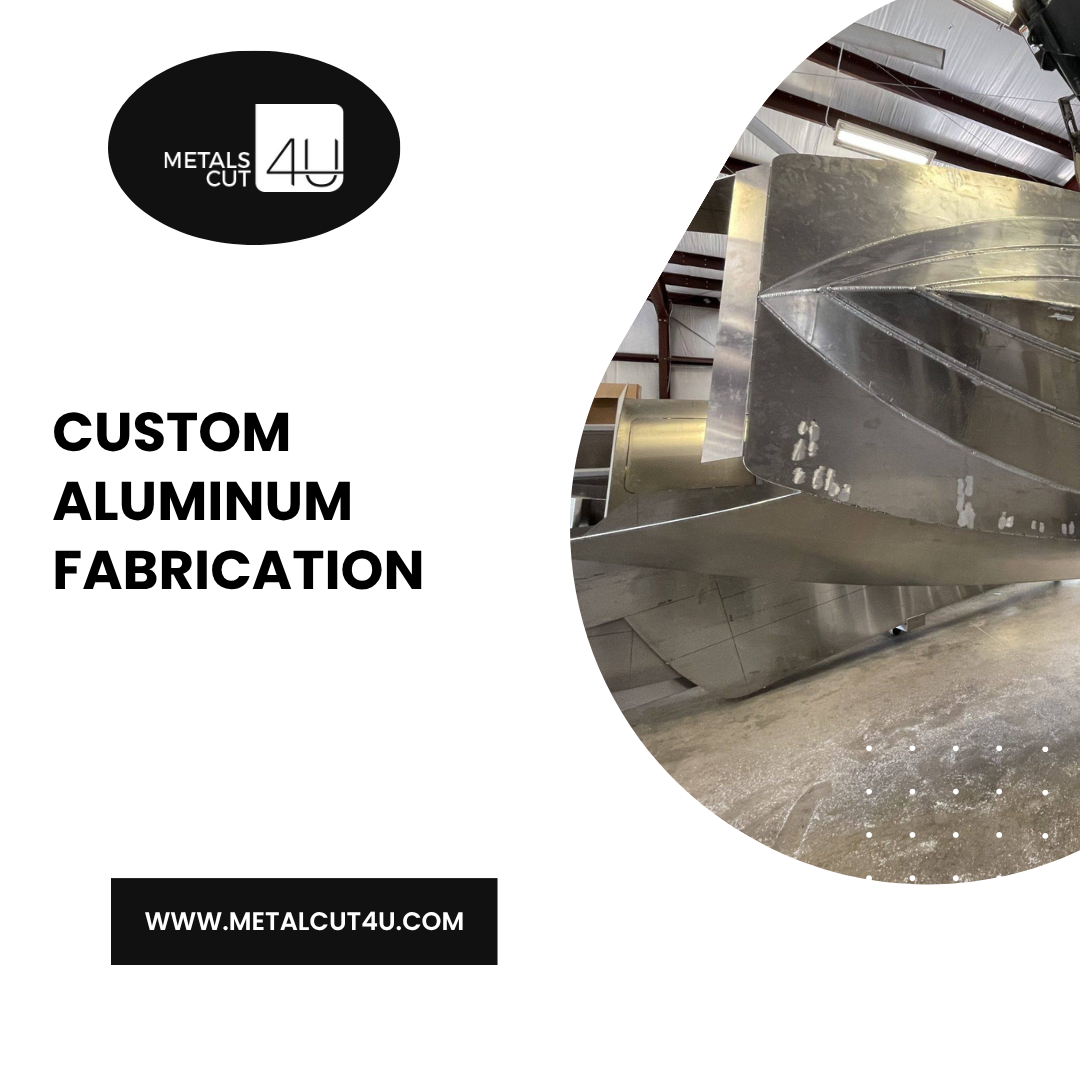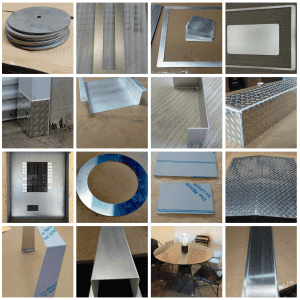Custom Aluminum Fabrication

Custom aluminum fabrication is one of the prime services required for businesses and individuals needing lightweight, durable, and corrosion-resistant metal parts tailored to specific designs. Whether it’s a simple aluminum kick plate or a complex enclosure for electrical equipment, custom aluminum fabrication makes it possible to achieve exact specifications and performance requirements.
This blog post will explore custom aluminum fabrication, looking at its advantages, uses, and the process of transforming raw aluminum into a finished solution.
Why Choose Aluminum for Fabrication?
Aluminum offers a wide range of properties that make it ideal for fabrication projects. It is lightweight yet strong, highly resistant to corrosion, and thermally and electrically conductive. These characteristics allow for a wide range of applications, especially where other metals might not be suitable.
One of the key benefits of aluminum fabrication is the metal’s formability. It can be easily cut, welded, bent, and shaped without compromising its structural integrity. This flexibility makes it an excellent choice for custom aluminum fabrication, where precision and performance are critical.
Moreover, aluminum is cost-effective in the long run. Its corrosion resistance reduces the need for frequent maintenance or replacement, while its recyclability makes it an environmentally friendly choice for manufacturers.
Plus, there are also several benefits of aluminum fabrication that make it the material of choice across industries:
-
Lightweight Yet Strong
Aluminum offers a high strength-to-weight ratio, which helps in reducing the overall weight of the final product. This makes it ideal for applications where every pound counts, like in the aerospace and automotive industries.
-
Corrosion Resistance
Aluminum naturally forms an oxide layer that protects it from rust and degradation, even in harsh environments. This inherent protection means aluminum components last longer and require less maintenance.
-
Recyclability
It is 100% recyclable without losing any properties, making it a sustainable option for long-term use. This high recyclability significantly reduces its environmental impact and can lead to cost savings in material sourcing.
-
Flexibility in Design
The custom aluminum fabrication process allows intricate designs and complex shapes to be achieved without compromising the material’s integrity. This design freedom empowers engineers and designers to create innovative solutions tailored to specific needs.
-
Cost-Effective in the Long Run
Reduced maintenance, high durability, and recyclability lead to lower long-term costs. While initial fabrication costs might vary, the extended lifespan and minimal upkeep of aluminum parts offer significant savings over time.
These benefits of aluminum fabrication continue to support its widespread adoption in industries where performance and reliability matter most.
Custom Aluminum Fabrication Process
The custom aluminum fabrication process includes multiple stages, each contributing to the production of a functional and reliable product. From design to delivery, each step is handled with accuracy to match the customer’s specifications.
-
Consultation & Engineering
Every project starts with a consultation. This is where the initial idea is discussed and the feasibility of the design is analyzed. Experienced engineers work closely with the client to understand the application and requirements of the part or product.
During this phase, choosing the right type and thickness of aluminum is also considered. Whether you need an aluminum diamond plate or a flat sheet, the correct base material is vital to the project’s success.
-
Cutting & Shaping
Once the design is finalized, the actual custom aluminum fabrication process begins with cutting and shaping. Using modern CNC machines, aluminum sheets are cut into the desired shapes with minimal waste and maximum precision.
Laser cutting, water jet cutting, and shearing are some of the common methods used. Bending and forming follow next to shape the aluminum into the required configuration. For instance, if a customer needs an aluminum kick plate, it’s cut to exact dimensions before being bent or formed to fit doors or other surfaces.
-
Assembly & Finishing
In the assembly stage, the fabricated aluminum parts are put together as per the design. This may involve welding, fastening, or using adhesives. Skilled fabricators ensure that every joint is secure and aligned properly.
Finishing options like powder coating, anodizing, or brushing may also be applied. These not only improve the appearance but also enhance the corrosion resistance of the aluminum, making it more durable.
-
Quality Assurance
Quality checks are integrated throughout the custom aluminum fabrication process. Every component undergoes inspection to ensure it meets dimensional tolerances and performance criteria.
If a project involves an aluminum diamond plate, the pattern, thickness, and finish are inspected carefully to confirm consistency and safety standards.
Uses of Custom Aluminum Fabrication in Various Industries
The uses of aluminum fabrication extend across a broad range of industries. Its versatility and strength make it a go-to material for various commercial, industrial, and consumer applications.
-
Electrical Enclosures
Aluminum’s non-magnetic and corrosion-resistant properties make it ideal for electrical enclosures. These enclosures protect sensitive electrical components from environmental elements and interference. Custom-sized enclosures are often designed for specific control systems or power units.
-
HVAC Systems
One of the most common uses of aluminum fabrication is in heating, ventilation, and air conditioning systems. Ductwork, housings, and other components are often made from aluminum due to its lightweight nature and ability to withstand temperature variations. The custom aluminum fabrication process ensures each part fits seamlessly into the overall HVAC system.
-
Agricultural Equipment
Aluminum parts are used in machinery, irrigation systems, and storage containers in the agricultural industry. Since these components are exposed to harsh outdoor conditions, the benefits of aluminum fabrication, like corrosion resistance and durability, play a key role. Custom fabrication allows farmers and equipment manufacturers to create solutions tailored to specific needs, increasing efficiency and longevity.
-
Original Equipment Manufacturers (OEMs)
OEMs require precision-made components that meet high standards for fit and function. The custom aluminum fabrication process is essential in producing these parts, as they often need to be lightweight, structurally strong, and corrosion-resistant. Whether it’s a bracket, panel, or enclosure, aluminum can be fabricated to match OEM specifications perfectly.
-
Retail Containment Solutions
In retail environments, custom aluminum fabrication is used for creating shelving, display units, and containment systems. These structures need to be attractive, lightweight, and easy to maintain. Aluminum offers a modern aesthetic and strength, while also allowing for custom designs to fit brand-specific requirements. From store fixtures to protective guards, the uses of aluminum fabrication in retail are vast and varied.
-
Automotive Industry
Conclusion:
Custom aluminum fabrication is not just about cutting and bending metal; it’s about delivering a precise, functional, and durable solution that meets specific project needs. From retail environments and OEM applications to HVAC systems and automotive parts, the uses of aluminum fabrication are continually growing due to its performance, longevity, and adaptability.
Whether you need an aluminum kick plate for daily wear protection or are searching for a reliable aluminum diamond plate for sale, working with a trusted custom fabricator like MetalsCut4U.com ensures the results are exactly what you need. Call 440-822-6381 today to get your custom aluminum fabrication project started.
